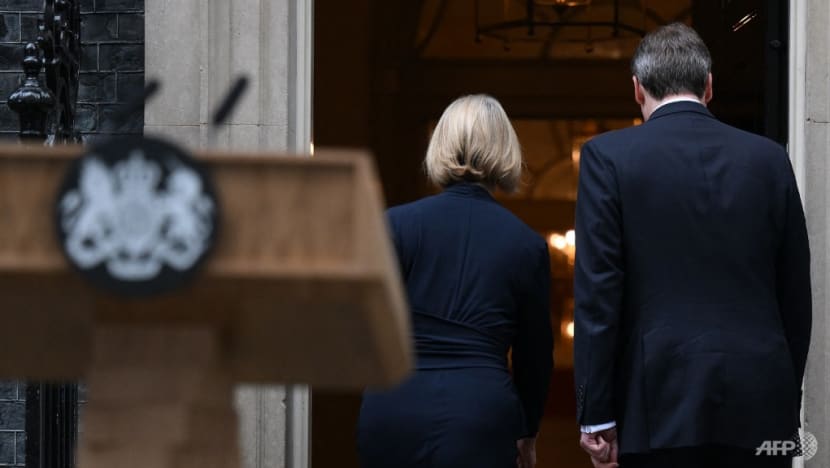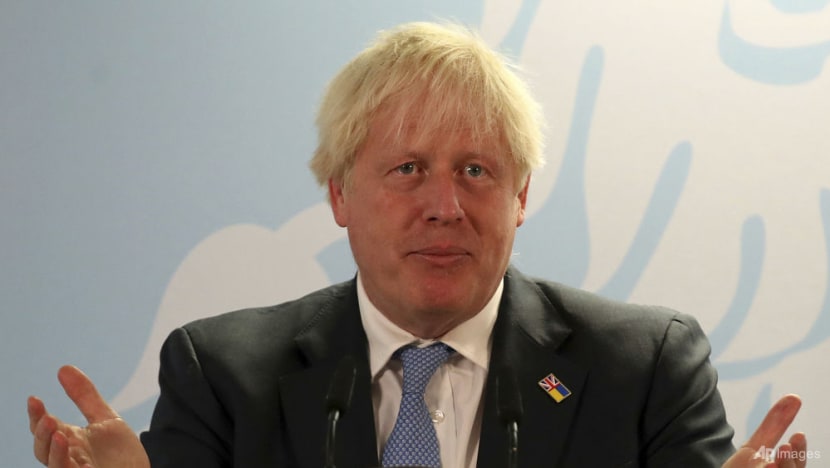Commentary: With Truss gone, yet another prime minister for the UK in weird time warp
Could Boris Johnson really return to Downing Street? Choosing the next British leader is an impossible choice when the Conservative Party is riven with factions and overwhelming personal rivalries, says this lecturer.

Liz Truss and her husband Hugh O'Leary walk back into 10 Downing Street on Oct 20, 2022 following a statement to announce her resignation. (Photo: AFP/Daniel Leal)
MELBOURNE: British politics currently exists in a weird time warp. Like some bad special effects from an early episode of Dr Who, time and reality are bent and twisted – only this time it is all sadly true.
This time warp operates in four main ways. The first is that a lot happens but nothing changes. Another prime minister has gone, but the same party, bereft of ideas, is still in office, clinging to power for its own sake.
It is a measure of the collapse of confidence among Conservative Members of Parliament that they fear electoral oblivion from what should be a quite unassailable majority of 71 seats in the current parliament.
The chaos of the management of the vote on fracking – a mischievous ploy by the opposition – should have been a comfortable backhander for the government. Instead, it precipitated the prime minister’s resignation.
It’s as if the election victory of 2019 never happened, and we have gone back in time to when the Conservatives only had a slim majority.
OUT OF TOUCH AND FIGHTING ON IDEALOGY
The second way the time warp operates relates to the poverty of thinking throughout the party. The fact Boris Johnson is one of the favourites to return to Downing Street suggests how out of touch the grassroots members of the party are with the rest of the country.

The parliamentary party sees the grassroots members as a liability and is keen to sideline them as much as possible in what will be a speed-dating version of a leadership contest over the coming week. Like German playwright Berthold Brecht said of the Communist Party of East Germany: The party needs to dissolve the people and elect a new one.
The third time warp is that the Tories now look like the “loony left” of the 1980s. Rather than being a party motivated by competently managing dull but important things like interest rates, it has morphed into an ideological fighting machine, tilting at windmills like the BBC and “critical race theory” (whatever that is).
Its ideological warriors sound like the inverse of beret-wearing, right-on Marxists from 1983: Seeking to win an ideological war of position by capturing the commanding heights of cultural institutions like the National Trust.
None of this helped the left in the 1980s. It is not helping the Conservatives now.
The fourth and last time warp returns us to an era before there was such a thing as the Conservative Party. During the 19th century, a group of men representing the interests of the landed classes and manufacturers eventually cohered into an organisation we would recognise as a political party. Time is now moving backwards, undoing this slow alchemy of centuries.
RISHI SUNAK, PENNY MORDUANT OR SUELLA BRAVERMAN?
Much of the problem with British politics is indeed the Conservative Party. But it is right to ask if there is such a party in the singular anymore? The Conservative Party is riven with factions and overwhelming personal rivalries.
It must be the worst place to work in Britain right now. But whatever the causes, it lacks a cohesiveness for even the most broad-church of political organisations.
This will make choosing the new leader an impossible choice.
Johnson is possible. He is a great campaigner, but that was back in 2019 before “partygate”. Rishi Sunak could run on an “I told you so” ticket but is a multi-millionaire, which would not go down well in the current context of the politics of cost of living.
Penny Mordaunt has kept her nose clean during the Truss tenure, but lacks experience. Suella Braverman is the loudest ideological warrior and not popular among MPs or the British public, so will presumably win.
PUBLIC SUFFERS FROM PARTY FACTIONS FIGHTING
Finally, bending space as well as time, the United Kingdom has turned into “Britaly”: A Dr Moreau-like hybrid of Britain and Italy where the bond markets are in charge, growth is sluggish, and only one party is in government, although the personnel seem to change constantly.
This all might seem like an open goal for the opposition Labour Party, which after the election loss in 2019 had resigned itself to further decades of permanent opposition. But there is something to be lamented here.
After the Republican Party in the United States, the Conservative Party is the oldest – and most successful – party in the world. Both parties have become riven with factions fighting what they see as existential ideological battles. The public in both countries suffers as a result.
It is time for the Conservative Party to have “a cup of tea, a Bex and a good lie down”. If they were in charge of their time warping trajectory, a return to a time before the lunatics took over the asylum would not be a bad place to stop and reflect.
Ben Wellings is a senior lecturer in politics and international relations at Monash University. This commentary first appeared on The Conversation.
















